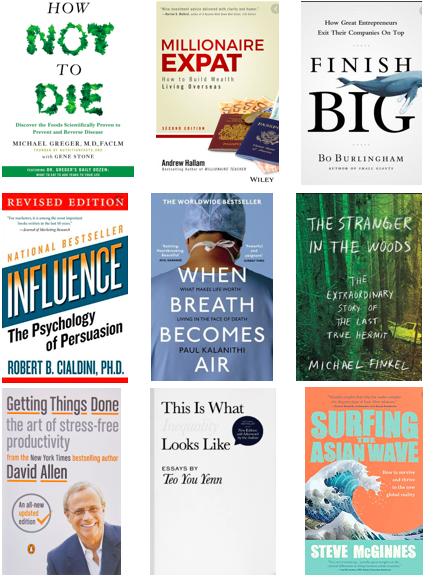I barely read anything until I turned 18, and suddenly, I started to read a lot, like really a lot, and I keep clocking about 30 books per year, which makes be both happy (so much good knowledge and deep dives!) and very sad (even if I hit my KPI of living up to 105 years, that’s only 2,100 books I’ll read, when any good bookstore has thousands in store!).

Anyway, here are the English books I really enjoyed reading this year and which I recommend:
- How not to die: we discussed this before. How nutrition impacts healthcare. The first half of the book is a compilation of large cohort research that shows the link between lots of different food and lots of different conditions, from cancer to Alzheimer, depression or stress. Just this part feels like Medicine 101. The second part lists out a dozen of key families of food to (re)integrate into our daily meals, from lentils to broccoli, flaxseed to dark leaf greens. Pro-vegetarianism, but hey, after reading this you’ll never be able to eat a chicken again believe me. I do NOT recommend the cookbook which is pricey and very complex.
- Millionaire Expat: well, now you know I’m not millionaire yet! Excellent read by expat teacher and author Andrew Hallam. It changed my view on personal finance (which is a hobby of mine and I thought I had a lot of knowledge on!), and I opted to follow his simple strategy of betting on a few global index funds (global stocks, global bunds, global REITs) instead of doing stock-picking, and to do it myself to avoid intermediary fees.
- Finish Big: recommended by a friend who’s entrepreneur when I was having doubts about my own company. Great stimulant for the mind and how entrepreneurs are as amazing at building businesses and as unprepared for the day they exit it, forcefully or willingly. Lots of insights on how to structure companies to make them exit-able, even if you don’t want too, it’s not gonna hurt to do so.
- Influence – The Psychology of Persuasion: a classic recommended by another friend entrepreneur during a Codevelopment coaching workshop we both attended. Great insights on how the mind works, from contrast to reciprocation, liking or scarcity. It’s pretty easy to apply some tricks in your daily life, and it’s simply a beautifully researched book with lots of cool studies showing how we often do what we do not know, but that someone else wants.
- When breath becomes air: not sure why that day at the Bali airport I picked both How not to die and this one. Very moving book written by Paul Kalanithi, a top neurosurgeon whom we understand is on the path of global success (Nobel Prize?), until he discovers a fast and nasty cancer is eating him from the inside. It’s sad, it’s very sad, and the last chapter is written by his wife. I remember vividly where I finished the book, barely able to breath as emotion choked me entirely.
- The stranger in the woods: truly incredible story of a chap who decided, on a nice day, to withdraw from society and live like a hermit in a wood in the US (Maine or Vermont, we rapidly understand it’s not a “fun” nature experience). For 27 years. He lived off burglarizing empty holiday chalets for food, and was actually staying in his DIY basecamp just minutes from a town and road, but he learned to be invisible even to trappers and rangers. Very moving to understand how painful can mankind be for some.
- Getting Things Done: I owe this revival of my productivity to yet another entrepreneur friend (you should find a few if you don’t have any!). Really a game-changer on how to organize one’s busy life and brain with a simple methodology. The thesis is that our brain is like a computer screen: it’s made to work, not to store screenshots and loads of dusty folders. So give your brain the option to remove stuff that keeps your bandwith busy and a way to deal with each intention in a special way.
- This is what inequality looks like: a local bestseller here in Singapore, a great book that dives into the small and big things that create inequality, a global phenomenon we all face. At the scale of Singapore, the author, a researcher, a combination of cultural bias, semi-intentional constructs such as rules by government agencies, and lack of luck, put a minority in a vicious cycle of poverty, lack of access to education, and eventually, those people get stuck where they are not bound to be. Stuffy and not an easy read, but enlightening especially in a city-state who’s always good at marketing itself.
- Surfing the Asian wave: guess what, another entrepreneur friend! Easy to read, well built book who takes us through a lot of interviews the author did with busy professionals, Asians and non-Asians, to reveal differences that will impact our business outcomes. The book manages not to fall into cliches, and gives us insights and recommendations on how to manage concepts such as Face, time, trust, in the context of the Asian markets.
You won’t loose your time with any of the above : )
M